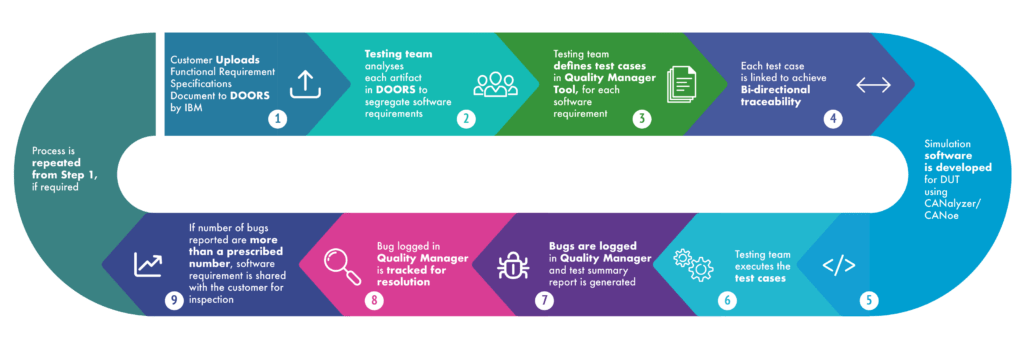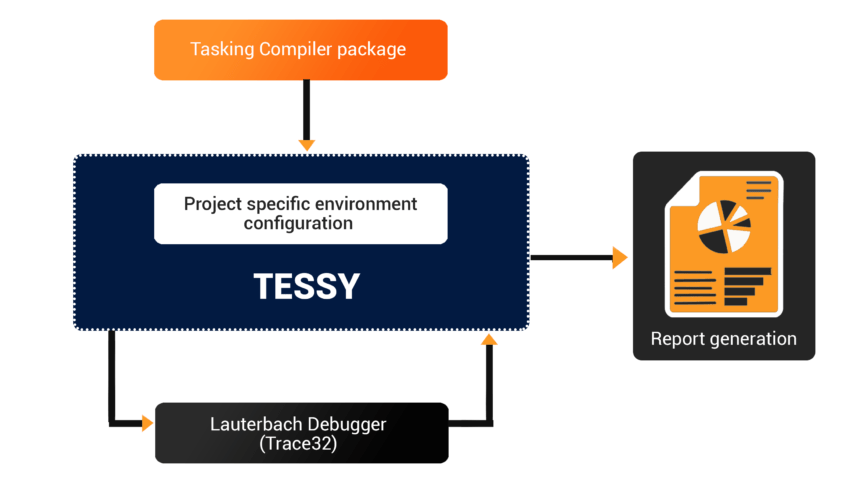Automotive ECU Testing | Functional Testing | HIL Testing
Learn About our Expertise in ECU Testing of Instrument Clusters, ADAS, Power Steering and Other Systems
Our Software & Hardware ECU Testing have in-depth Automotive Domain expertise. For close to two decades, we have been partnering with Automotive OEMs and Suppliers from USA, China, Taiwan, South Korea, India, and Europe.
Our Automotive ECU Testing Teams have experience in delivering projects for Functional, Unit, Integration and System testing of the following automotive products:
- Instrument Clusters (tell-tales, warnings, gauges, chimes and support for various languages)
- Seating Comfort Systems: Lumbar Massage Support.
- In Vehicle Infotainment System
- HVAC System (heater mats and blowers).
- Head-up display (HUD)
- ADAS components like Cruise Control
- Anti-lock braking system
- Seat & Mirror ECU (Memory Store/Recall, Easy Entry/ Easy Exit, Reverse Mirror Support)
- Electronic Power Steering (EPS)
Support for Automotive ECU Testing - Unit Testing, Integration Testing & Functional (HIL, MIL, SIL) Testing
Our software and hardware testing engineers help you develop the ‘Test Strategies’ for all stages of automotive testing- unit, integration and functional testing.
- Statement Coverage– We ensure that all code blocks are tested thoroughly. This is a preliminary ECU testing technique that precedes branch coverage.
- Branch Coverage– In-depth view of the code by testing all conditions. Ensures no code branch causes any anomalies
- Decision or Boolean Coverage (MC/DC) – We test every possible outcome of a decision and all entry/exit points are checked. Recommended for ASIL-D compliance as per the Functional Safety framework, as defined by ISO 26262 standard.
- Expertise in Testing and Verification tools such as CANTATA, Mx-VDev, Tessy Tool, RTRT and more
- Thorough testing of each interface of the sub modules with all other modules.
- The interface code is checked to ensure proper interaction with other interfaces.
- We have expertise in delivering integration testing projects using tools like CANTATA, CAPL Script (Vector), Mx-VDev.
- We provide support for execution of test-case in order to achieve the desired ASIL Grade (ASIL B/ASIL C/ASIL D) for automotive software/ hardware, as per the ISO 26262 standard.
- Real-time simulation with HIL Testing (Hardware-in-loop): Automation in HIL Testing using tools like VT System.
- MIL Testing (Model-in-loop)– Expertise in MATLAB/Simulink tools for creation of the testing environment to verify the model
- SIL Testing (Software-in-loop )– Algorithm testing at all stages of product development within the modeling environment.
- We have expertise in execution of HIL/MIL/SIL testing with the help of tools such as CANalyzer, LabView, ETAS Tool Chain, Rational Quality Manger
- Complete test coverages, as per the ISO 26262 standard, to ensure that required ASIL grade (ASIL B/ASILC/ASIL D)is achieved
- Support for CAN, Ethernet, and LIN conformance test
- CAN conformance test as per ISO 11989 standard
- LIN conformance test as per ISO 17987 standard
- Ethernet Conformance Testing as per Open Alliance TC8 (Layer 1-7) Automotive Ethernet ECU Test Specification or OEM specific Test standards
- Automated execution of CAN, LIN and Ethernet conformance test using different tools
A Handbook on Functional Testing
Learn more about MIL, SIL and HIL Testing
of Automotive Software
A Handbook on Functional Testing
Learn more about MIL, SIL and HIL Testing
of Automotive Software

[Demo] Functional Testing of HVAC, Mirror, and Seat Control Unit
ECU Testing: Understanding the Process Flow Diagram

- The automotive software or hardware testing requirements are uploaded to Rational DOORS Tool (a Requirement Management Tool). Any kind of changes, in the testing requirements, can be managed with the help of this tool.
- Each testing artifact is then analyzed to segregate the software requirements against which functional testing is required to be performed.
- Rational, a Quality Manager Tool is then used to define the test cases w.r.t the requirements. Single test case might fulfill multiple requirements.
- The test cases are then executed using various functional testing tools such as LabView, ETAS & VT System.
- Post the completion of the functional testing, test reports are generated, and bugs are logged in Rational Quality manager.
- These bugs are then tracked for resolution and shared with the customers for inspection. The steps are repeated till the number of bugs come down to acceptable value.
ECU Testing Success Stories: HIL Testing, MIL Testing, SIL Testing & more

Automated Unit Testing (using Tessy Tool) for a Body Control Module (BCM) Application
About the Customer
A Tier-1 supplier of Automotive components.
Business Challenge
In the absence of in-house skills related to Automation in Software Testing, the customer faced headwinds in showcasing the required testing reports to the OEMs.
Embitel’s Solution
The following Software modules were tested using Tessy (Unit Testing Tool):
- CAN BUS Drivers.
- UDS Protocol Stack (ISO 13400).
- Low-Level Drivers such as NVM, Timer, SPI, ADC, MCU, Clock.
- Base Software Module (BSW) including NVM Handler, PWM Handler, Scheduler and more.

MIL and SIL testing of Autonomous Guidance Sys. SIMULINK, Statflow, TruckSim
About the Customer
A Tier 2 Supplier based in UK
Business Challenge
Our goal was to develop a sophisticated simulation for truck dynamics and control systems.
Embitel’s Solution
We delivered:
- An advanced Trucksim model with comprehensive vehicle dynamics.
- Seamless Simulink integration using VS commands for data flow.

Mutation Testing of an Automotive EPS for ISO 26262 (ASIL D) Compliance
About Customer
An Automotive Engineering Company, specializing in Powertrain and Body Electronics Development
Business Challenge
To perform mutation testing to meet ASIL D compliance as per ISO 26262 standard
Embitel’s Solution
- All the test-cases were executed and mutant testing results were reported using the proprietary tools of our customer.
- Our automotive ECU software testers analyzed mutant test results to identify ‘acceptable’ and ‘not acceptable’ mutants (mutant codes that were not killed).
Customer FAQs for Automotive ECU Testing - Unit, Integration, Functional Testing
Ans. Yes, we have experience in helping such customers in setting-up such test labs.
Our V&V (Verification & Validation) Consultants will travel to your location and set-up the Offshore Development Centre (ODC).
Basis your requirements, the validation and testing tools will also be deployed for the testing processes. Any additional support will also be provided as per the project specifications.
Ans. Yes, our Consultants can provide testing of your existing product and deliver the required test reports.
The test reports will be generated as per the specifications of the project. Our testing and validation team has expertise in various tools, following is the indicative lists of such tools:
- Tessy tool, CANTATA, RTRT for Unit Testing,
- CAPL Script, Mx-VDev for Integration testing
- CANAlyzer, LabView, ETAS for HIL Testing, SIL Testing and MIL Testing.
We have collaborated with some of our customers for testing of Low-level drivers and protocol software stacks such as UDS (ISO 14229) and CAN (ISO 11898).
We have an industry-recognized and proven competency in Tessy tool.
- Test Manager: A test manager is usually a senior testing engineer. He/She oversees the project, plans the test strategy and interacts with the customers on a regular basis.
- Testing Engineers: Test Engineers’ role is to perform the tests, be it unit testing, integration or HIL/MIL/SIL Testing. They write the test cases based on requirements and execute them using different testing tools.
Ans. Absolutely! We take the safety and integrity of your code very seriously. To follow it in letter and spirit, we strictly adhere to the guidelines prescribed in standards such as GDPR and ISO 27001.
At Embitel, it is mandatory for all the members of the Testing Team to clear an online test for these standards.
On top of this, every code transfer is done over Secure FTP.
- Unit Test Reports
- Integration Test Reports
- Validation Reports
Ans. We keep the customers apprised of the project development by sharing the Timesheets on a weekly or monthly basis.
Details of completed and pending tasks, overall health of the project. are also mentioned in the timesheet.
Project Managers are also in constant touch with the customers to update them on the latest developments of the project.
- Advanced Testing Methodologies: Incorporating sophisticated testing techniques such as model-based testing and hardware-in-the-loop (HIL) simulations to address the complexity of ADAS and autonomous systems.
- Increased Automation: Leveraging automated testing frameworks to efficiently manage the extensive testing demands of advanced automotive systems.
- Use of AI and Machine Learning: Applying AI and ML to optimize testing processes, predict potential failures, and analyze test results for deeper insights.
- Collaboration with Regulatory Bodies: Ensuring compliance with evolving standards and regulations by actively engaging with industry consortia and regulatory bodies.
- Emphasis on Cybersecurity: Addressing the cybersecurity challenges associated with connected vehicles through comprehensive vulnerability assessments and penetration testing.
- Continuous Learning and Adaptation: Staying abreast of technological advancements and continuously updating testing protocols to reflect the latest industry developments.
- Customized Testing Solutions: Offering tailored testing services to meet the specific requirements of diverse ADAS and autonomous systems.
These strategies enable ECU testing services to support the development of safe, reliable, and secure automotive technologies.
Related Blogs: Learn more about Automotive ECU Testing, Test Automation Frameworks and Vehicle Diagnostics Stacks
- Check C framework for Automotive Applications: A Powerful Unit Testing Tool that’s Smart & Flexible.
- [Vlog] Introducing Check C Framework: The Power-Packed Tool for Unit Testing of Automotive Software
- How vTest Studio and CANoe Tools Empower the Automation of ECU (Electronic Control Unit) Testing
- VT System Configuration Services for HIL Testing of Automotive Control Units (ECU)
- How to Perform Hardware-in-Loop Testing for an Automotive Solution Development Project
Knowledge bytes
- What is Automotive ECU Testing?
Ans: Automotive Electronic Control Unit (ECU) testing is the process of evaluating the functionality, reliability, and performance of ECUs within a vehicle.
ECUs are the electronic modules responsible for controlling various aspects of a vehicle’s operations, such as engine management, transmission control, braking system, power steering, and infotainment systems.
ECU Testing involves a series of checks and simulations to ensure that these units meet all specifications, perform as expected under various conditions, and comply with safety and regulatory standards. This process can include hardware-in-the-loop (HIL) testing, software-in-the-loop (SIL) testing, and on-vehicle testing, covering everything from individual component functionality to the ECU’s interaction with other vehicle systems.
- How do you test the ECU?
- What are different Tools Used for Unit Testing, Integration Testing and Functional Testing for Automotive Systems?
- DOORS Requirement Management Tool: It is a tool from IBM that helps capture, trace, analyze, and manage the requirements for a customer. It proves to be a useful tool in automotive software/hardware testing especially, functional testing.
- Rational Quality Manager: It is a web-based tool from IBM . It adds value to the Functional Testing (HIL,MIL,SIL) process by automating the test planning, test construction and test management activities.
- CANalyzer/CANoe: These are software development and Testing tools from Vector. One of the functions of CANalyzer/CANoe is to help in analysis and simulation of network communication between various Electronic Control Units (ECU).
- LabView: LabView is a Test Automation Framework from National Instrument. It helps to control and customize a Functional Testing system. LabView expedites the SIL, MIL and HIL Testing process and proves to be an efficient testing framework that also helps reduce time-to-market.
- CANTATA: CANTATA is also a Test Automation framework. CANTATA automates Unit Testing and Integration Testing. It enables the software developers to achieve compliance with different standards such as ISO 26262, MISRA C & more.
- Mx-VDev: Mx-VDEV is a very popularly used Unit and Integration Testing tool. Mx-VDEV automates the creation and execution of test cases for Unit Testing and Integration Testing of Electronics Control Unit applications.
- RTRT: RTRT is a test automation framework, that can perform a number of automotive software testing activities such as unit testing, coverage analysis and system testing.
- ETAS: ETAS is also a test automation tool, that can perform HIL testing as well. In one of our projects, we have used ETAS tool for HIL testing of Exhaust System Software.


